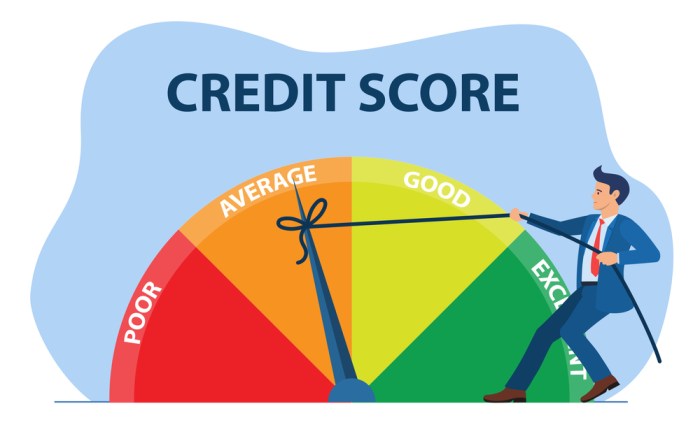Diving into Credit score improvement, buckle up for a ride through the ins and outs of boosting your credit score like a pro. Get ready to uncover the secrets to financial success and stability in the world of credit.
We’ll explore the key factors that impact your credit score and unveil the strategies that can help you elevate your financial game.
Understanding Credit Scores
A credit score is a numerical representation of an individual’s creditworthiness, based on their credit history and financial behavior. It is used by lenders to determine the likelihood of a borrower repaying their debts on time. Credit scores typically range from 300 to 850, with higher scores indicating lower credit risk.
Factors Influencing Credit Scores
- Your payment history: Timely payments on credit accounts are crucial for a good credit score.
- Amounts owed: The total amount of debt you owe, including credit card balances and loans, impacts your score.
- Length of credit history: A longer credit history can have a positive effect on your credit score.
- Credit mix: Having a diverse mix of credit accounts, such as credit cards, loans, and mortgages, can be beneficial.
- New credit: Opening multiple new credit accounts within a short period can lower your score.
Importance of a Good Credit Score
Having a good credit score is essential for various financial activities, such as applying for loans, renting an apartment, and even getting a job. A higher credit score can lead to better interest rates and more favorable terms on loans and credit cards, saving you money in the long run.
Strategies for Improving Credit Score
Improving your credit score is essential for financial stability and access to better loan terms. Here are some effective strategies to boost your credit score:
Make Timely Payments
One of the most impactful ways to improve your credit score is by making timely payments on all your credit accounts. Payment history accounts for a significant portion of your credit score, so ensuring on-time payments can help boost your score.
Reduce Credit Card Balances
Another important strategy for improving your credit score is to reduce your credit card balances. High credit card balances relative to your credit limit can negatively impact your credit score. Aim to keep your credit utilization ratio below 30% to see a positive impact on your score.
Monitoring and Managing Credit Score

Regularly monitoring your credit score is crucial for maintaining financial health. By keeping an eye on your score, you can catch any discrepancies or issues early on and take steps to rectify them promptly.
Identifying Errors on Your Credit Report and Rectifying Them
- Check your credit report from all three major credit bureaus – Equifax, Experian, and TransUnion – at least once a year. You are entitled to one free report from each bureau annually.
- Review the report carefully for any inaccuracies, such as incorrect personal information, accounts you don’t recognize, or late payments that you know you made on time.
- If you spot any errors, file a dispute with the credit bureau reporting the mistake. Provide supporting documentation, such as payment records or correspondence, to support your claim.
- Monitor your credit report regularly after disputing errors to ensure they have been corrected.
Significance of Keeping Credit Utilization Low
Maintaining a low credit utilization ratio is essential for a healthy credit score. Your credit utilization ratio is the amount of credit you are using compared to the total amount of credit available to you.
- Aim to keep your credit utilization below 30% of your total available credit. High credit utilization can signal financial distress to lenders and negatively impact your credit score.
- To lower your credit utilization, consider paying down existing balances, requesting a credit limit increase, or opening a new credit account to increase your available credit.
- Regularly monitor your credit card balances and make timely payments to keep your credit utilization low and improve your credit score over time.
Building Credit History
Establishing a positive credit history is crucial for financial stability and future opportunities. It involves demonstrating responsible borrowing and repayment behavior over time. Here are some key ways to build a strong credit history:
Types of Credit-Building Options
- Secured Credit Cards: These require a security deposit but can help individuals with limited credit history establish a positive track record.
- Credit Builder Loans: These loans are designed to help individuals build credit by making regular payments over a set period.
- Authorized User Status: Being added as an authorized user on someone else’s credit card can help establish credit history, as long as the primary account holder has good credit habits.
Role of Different Types of Credit Accounts
- Revolving Credit Accounts: Credit cards fall under this category and play a significant role in building credit history. It is important to use them responsibly and pay off the balance in full each month.
- Installment Loans: These include loans for vehicles, student loans, or mortgages. Making timely payments on installment loans demonstrates the ability to manage long-term debt.
- Retail Accounts: Store credit cards can also contribute to building credit history. However, it is essential to use them wisely and avoid carrying high balances.
